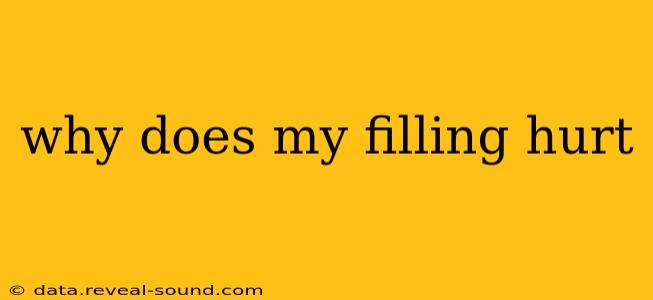Dental fillings, while designed to protect and restore damaged teeth, can sometimes cause pain. This discomfort can range from mild sensitivity to sharp, throbbing pain, and understanding its cause is crucial for effective treatment. This comprehensive guide will explore the various reasons why your filling might be hurting, helping you understand your options and seek appropriate dental care.
Is the Filling Itself the Problem?
While less common, the filling material itself can sometimes be the culprit. This is particularly true with older fillings, or those made with materials that have since been superseded by more biocompatible options.
- Material Degradation: Older amalgam (silver) fillings can sometimes corrode or expand, irritating the surrounding tooth structure and causing pain. Modern composite resin fillings are generally less prone to this issue.
- Allergic Reaction: Though rare, some individuals may have an allergic reaction to a specific filling material, leading to inflammation and pain. This is more likely with certain metals.
- Poorly Placed Filling: If the filling wasn't placed correctly, it might be irritating the pulp (the soft tissue inside your tooth containing nerves and blood vessels) or causing micro-fractures in the tooth.
What Happens If the Filling Fails?
A failing filling can lead to several issues that cause pain:
- Secondary Decay: Bacteria can penetrate around the edges of an old or poorly placed filling, leading to cavities beneath the filling. This new decay will cause pain and may require more extensive treatment.
- Cracked Tooth: A filling might mask a pre-existing crack in the tooth. The crack can worsen over time, eventually leading to significant pain, especially when biting or chewing.
- Pulpitis (Inflammation of the Pulp): If decay reaches the pulp, it causes inflammation, leading to pain that can be spontaneous or triggered by temperature changes (hot or cold). This is a serious condition requiring root canal treatment.
Why Does My Filling Hurt After a Filling Procedure?
Post-filling sensitivity is quite common, usually subsiding within a few days. However, persistent or severe pain warrants a visit to your dentist.
- Post-operative Sensitivity: Temporary sensitivity to hot and cold is a normal reaction to the procedure itself, as the tooth's nerve endings are temporarily exposed.
- Irritation from the Filling Material: The filling material might cause minor irritation until the tooth fully recovers.
- Bite Issues: The new filling might alter your bite slightly, causing discomfort in the jaw joint or the affected tooth.
What if My Filling Hurts When I Bite Down?
Pain when biting or chewing indicates a more significant issue and requires prompt attention.
- High Filling: The filling may be too high, causing your teeth to hit it first when you bite. This can lead to pain, discomfort and even jaw pain.
- Cracked Tooth: A pre-existing crack, exacerbated by the filling process, is a likely cause.
- Fractured Tooth: The tooth may have fractured either during the filling procedure or due to underlying weakness.
Can a Loose Filling Cause Pain?
A loose filling can cause sensitivity to temperature changes and pain when biting down.
- Poor Adhesion: The filling material may not have adhered properly to the tooth.
- Tooth Decay: Decay under the filling can cause it to loosen.
When Should I See a Dentist About a Painful Filling?
Persistent pain, especially if it's severe, increases in intensity, or is accompanied by other symptoms (swelling, fever), necessitates an immediate appointment with your dentist. Don't delay seeking professional care.
Summary: Addressing Filling Pain
Pain associated with dental fillings can stem from a variety of factors, ranging from minor post-procedure sensitivity to more significant issues requiring restorative treatment. Early diagnosis and professional attention are key to preventing further complications and ensuring the long-term health of your teeth. If you are experiencing discomfort related to a dental filling, schedule a consultation with your dentist as soon as possible. They can accurately diagnose the problem and provide the appropriate treatment.
